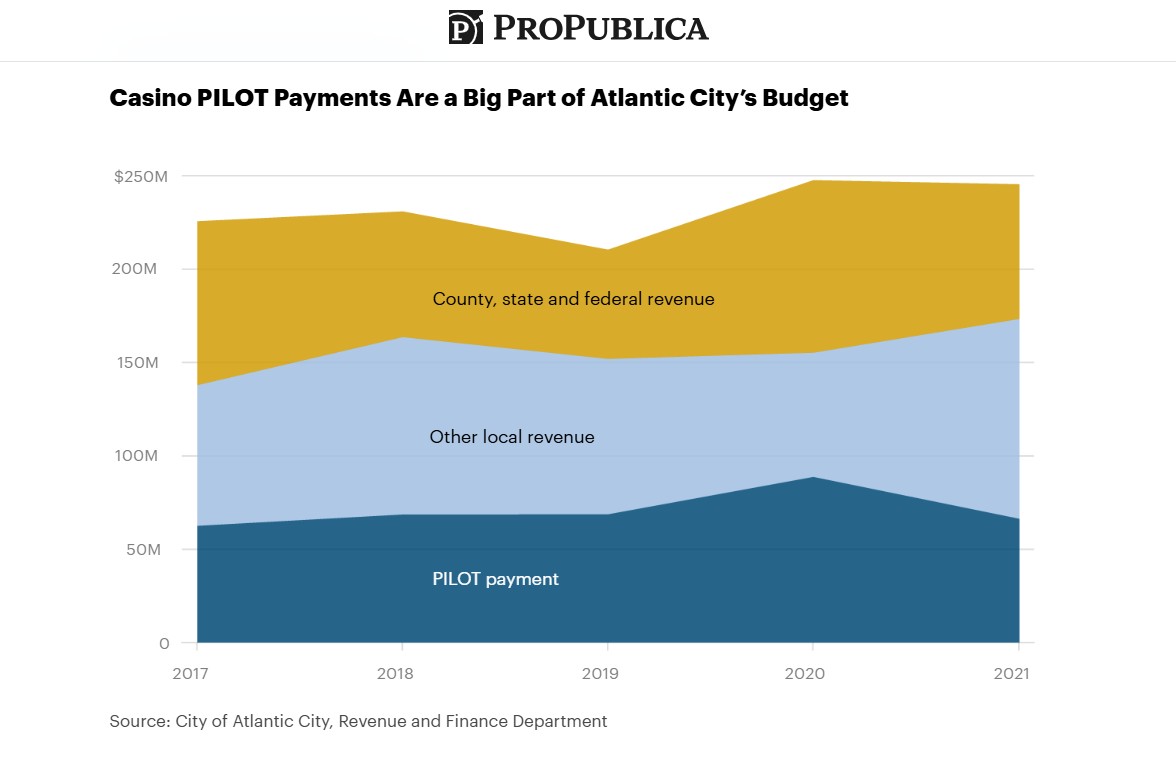Beyond Pilot: Is Atlantic City ready?
By Sarah Grady, Assistant Director LIGHT - Stockton University
The “Casino Property Tax Stabilization Act,” P.L.2016, c.5 (C.52:27BBBB-18 et seq.), also referred to as the Atlantic City casino “PILOT,” was enacted on May 27, 2016. It was first implemented in calendar year 2017 and is presently set to end at the conclusion of calendar year 2026.
Sarah Grady, MA
Assistant Director LIGHT, Stockton University
PILOT was initially introduced to solve a pressing economic challenge that legislators
and industry leaders of the time felt threatened the future of Atlantic City’s casino
industry, and with it the economic stability of Atlantic City.
The act was passed in 2016, a low point for the Atlantic City casino industry, and
in the wake of four out of the city’s, at one time, 12 casinos closing their doors.
The casino closures came toward the end of a period Dr. Oliver Cooke of Stockton University
has called in hindsight the “lost decade (Cooke 2017).” The years 2006 through 2016
saw year-over-year declines in the industry’s gross gaming revenue as Atlantic City
lost its East Coast gaming monopoly, and market share, to new facilities in Pennsylvania
(Slots were authorized in 2004 and Mohegan Sun at Pocono Downs began operation in
November 2006, poker and table games were added in 2010), Delaware (the state authorized
table games including poker in 2010, slots had been legal since 1995) and upstate
New York (the state authorized commercial casino gaming in 2013). This competition
led to a reassessment of Atlantic City casino property values, which in turn led to
property tax appeals that proved costly for the city. In April 2016, Moody's Investors
Service gave Atlantic City a credit rating of Caa3, which was one notch above default
(The Associated Press 2016) (Linnane 2016).
PILOT was proposed in this context as a way of relieving some of the pressures weighing
down the casino industry and stabilizing the Atlantic City economy by making the industry's
tax contributions more predictable. At least on a superficial level, PILOT appears
to have achieved those goals. This, however, has not been without some "growing pains."
The authors of the 2016 act could not have predicted the impacts of the COVID-19 pandemic,
which shut Atlantic City’s land-based operations from March through July 2020, nor
could they have predicted how this closure (and likely also the launch of sports wagering
in 2018) would serve as a catalyst for growth in the internet gaming market. Although
the launch of internet gaming in 2013 pre-dates the act, it could be said that this
gaming product has only recently found its stride. Cognizant of these major disruptions
to the industry, legislators pursued an amendment to the act (P.L. 2021, c.315) which was passed into law in December 2021. Under this new version of PILOT, among
other things, the GGR based payment tiers used to set the casino's tax payments were
revised and Internet gaming and sports wagering (which is primary conducted online)
are excluded from the GGR total used in this calculation (Danzis, 2021). The amendment,
has not been without its opponents. As of October 2024, legal disputes around the
law and its effects were still being heard (Brunetti Post, 2024).
By some metrics Atlantic City is doing better than it ever has. As of year-end 2024,
New Jersey Casino Control Commission Chairman James Plousis told the media that “together,
internet gaming win and sports wagering revenue pushed Atlantic City’s annual total
gaming revenue to nearly $5.7 billion – the highest figure in its history” (Fazelpoor
2025), and, as of April 2024, Moody’s Investors Service had given the City of Atlantic
City an issuer rating of Ba1, maintaining a positive outlook in the city (The City
of Atlantic City 2024).
But, when PILOT sunsets at the end of 2026, will the industry, and city, be ready?
As alluded to in Chairman Plousis’ remarks to the press, the success of internet gaming
and sports betting have contributed to record levels of total gross gaming revenue
(GGR) for Atlantic City casino operators. Record GGR, however, does not always translate
to gross operating profits (GOP), a general measure of the industry’s success.
At year-end 2023 (year-end 2024 figures are not yet available at time of publication),
GOP for Atlantic City’s nine casino operators totaled $780.6 million, a 4.1% decline
from the prior year (New Jersey Division of Gaming Enforcement 2024). For comparison,
with eight operators, at year-end 2016 GOP for Atlantic City totaled $587.4 million
a 7.3% increase over 2015 (New Jersey Division of Gaming Enforcement 2017). In that
same year, 2016 GGR ($2.6 billion) was approximately half of year-end 2023 ($5.2 billion)
and did not include revenues from sports betting, which would not be introduced until
2018 (New Jersey Division of Gaming Enforcement 2017) (New Jersey Division of Gaming
Enforcement 2025).
Other variables, like inflation, increases in operating costs and revenue share agreements
with third-party vendors, aside operators have doubled GGR, added a ninth operator
and sports wagering since 2016. As a result, GOP has increased by approximately a
third (32.9%) in that seven-year span.
GOP has increased by approximately a third (32.9%) in that seven-year span."
Under these circumstances would the Atlantic City casino operators be ready to end PILOT in 2026 and once again pay taxes based not on the prior year’s collective gaming revenues (as of 2022 excluding internet gaming and sports wagering) but on the individual assessed values of their properties?
By returning to a property-value-based model for assessing casinos’ property taxes, the city could once again be opening itself to costly tax assessment appeals, such as those that pushed the city to the brink of bankruptcy in 2016. And even more may be at stake. When The Press of Atlantic City and ProPublica examined the impact of a 2021 amendment to how the PILOT was calculated (revenues from internet gaming and online sports wagering were excluded from the tax calculation and other adjustments were made to the payment scales beginning 2022), they discovered that funds received from PILOT may account for as much as a third of the city’s annual budget (Burdo, Casinos pled poverty to get a huge tax break. Atlantic City is paying the price. 2022).
When you include other direct and indirect impacts of the casino industry in Atlantic
City, such as employment, the purchase of goods and services from local vendors and
the volume of visitors that are attracted to the destination by the casino resorts
and their amenities, it is clear that while some diversification of the local economy
has taken place, Atlantic City is not yet ready for a future without a strong casino
industry.
For the health of both the casino industry and the city itself, it is vital that careful
thought be given to PILOT and what it should look like beyond 2026. To ensure an optimal
outcome for all parties, the city's many stakeholders most come together to craft
a plan that fosters stability and growth without undue hardship on any one entity.
References:
Brunetti Post, Michelle. 2024. "Appeals court vacates awards, sends Atlantic County casino PILOT case back to Superior Court." The Press of Atlantic City, October 22. https://pressofatlanticcity.com/news/local/casinos/pilot-appeals-court-casinos/article_c20ce704-9000-11ef-82de-430101c86d81.html.
Burdo, Alison. 2022. "Casinos pled poverty to get a huge tax break. Atlantic City is paying the price." Propublica, June 2. https://www.propublica.org/article/atlantic-city-casinos-taxes-gambling-pilot#:~:text=The%20plan%20was%20adopted%20in,prior%20year's%20total%20gaming%20revenue.
—. 2022. "New Jersey Officials Refused to Provide the Numbers Behind New Casino Tax Breaks. So We Did the Math." ProPublica, June 2. https://www.propublica.org/article/new-jersey-officials-refused-to-provide-the-numbers-behind-new-casino-tax-breaks-so-we-did-the-math.
Cooke, Oliver. 2017. "Atlantic City's Redevelopment: Digging out from a lost decade." South Jersey Economic Review, March 28: 1-2. https://online.fliphtml5.com/ivrx/qens/#p=1.
Danzis, David. 2021. "Atlantic City Casinos In Danger Of Closing Says NJ’s Top Lawmaker." PlayNJ, December 9. https://www.playnj.com/news/atlantic-city-casinos-in-danger-of-closing/61224/.
Fazelpoor, Matthew. 2025. "NJ sets several gaming records to close out 2024." NJBiz, January 17. https://njbiz.com/nj-sets-several-gaming-records-to-close-out-2024/.
Linnane, Ciara. 2016. "Atlantic City Could Default in Weeks, Ratings Agency Says." MarketWatch, March 9. https://www.marketwatch.com/story/atlantic-city-could-go-bust-in-one-month-2016-03-09.
New Jersey Division of Gaming Enforcement. 2024. "ATLANTIC CITY CASINO INDUSTRY STATEMENT OF INCOME STATISTICS FOR THE QUARTER ENDED DECEMBER 31, 2023 AND 2022." New Jersey Office of the Attorney General, State of New Jersey, Atlantic City. https://www.nj.gov/oag/ge/docs/Financials/QuarterlyFinRpt2023/4thQTR2023PressRelease.pdf.
New Jersey Division of Gaming Enforcement. 2017. "ATLANTIC CITY CASINO INDUSTRY STATEMENT OF INCOME STATISTICS FOR THE TWELVE MONTHS ENDED DECEMBER 31, 2016 AND 2015." New Jersey Office of the Attorney General, The State of New Jersey, Atlantic City. https://www.nj.gov/oag/ge/docs/Financials/QuarterlyFinRpt2016/4thQTR2016PressRelease.pdf.
New Jersey Division of Gaming Enforcement. 2017. "THE ATLANTIC CITY CASINO INDUSTRY YEAR-TO-DATE WIN COMPARISON FOR THE YEAR-TO-DATE ENDED DECEMBER 2016 VERSUS 2015." New Jersey Office of the Attorney General, State of New Jersey, Atlantic City. https://www.nj.gov/oag/ge/docs/Financials/PressRel2016/December2016.pdf.
New Jersey Division of Gaming Enforcement. 2025. "YEAR-TO-DATE COMPARISON FOR THE YEAR-TO-DATE ENDED DECEMBER 2024 VERSUS 2023." New Jersey Office of the Attorney General, State of New Jersey, Atlantic City. https://www.nj.gov/oag/ge/docs/Financials/PressRelease2024/December2024.pdf.
O'Connor, Devin. 2024. "New York Gov. Kathy Hochul Vetoes Bill to Accelerate Downstate Casino Process." Casino.org, November 26. https://www.casino.org/news/new-york-gov-kathy-hochul-vetoes-bill-to-accelerate-casino/.
The Associated Press. 2016. "Atlantic City Could Default in Weeks, Ratings Agency Says." The New York Times, March 9. https://www.nytimes.com/2016/03/10/nyregion/atlantic-city-could-default-in-weeks-ratings-agency-says.html.
The City of Atlantic City. 2024. "Moody’s Upgrades Atlantic City’s Issuer Rating, Outlook Stays ‘Positive’." www.acnj.gov. April 9. https://www.acnj.gov/News/View/1852/moody-s-upgrades-atlantic-city-s-issuer-rating-outlook-stays-positive.






